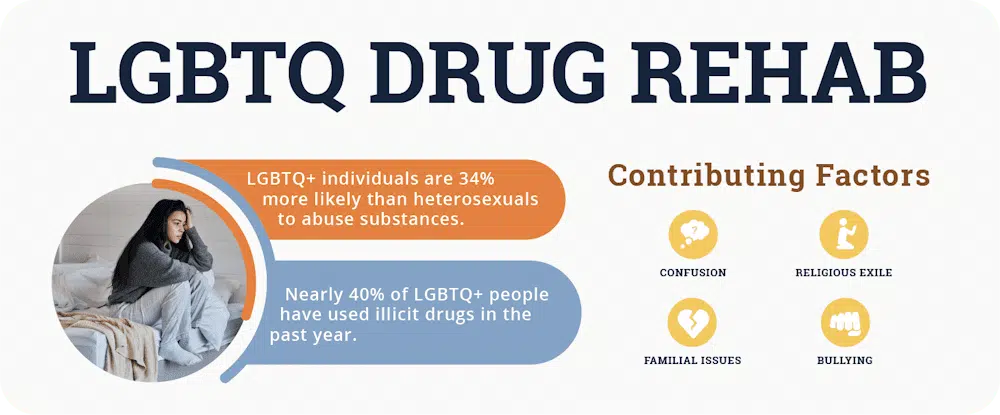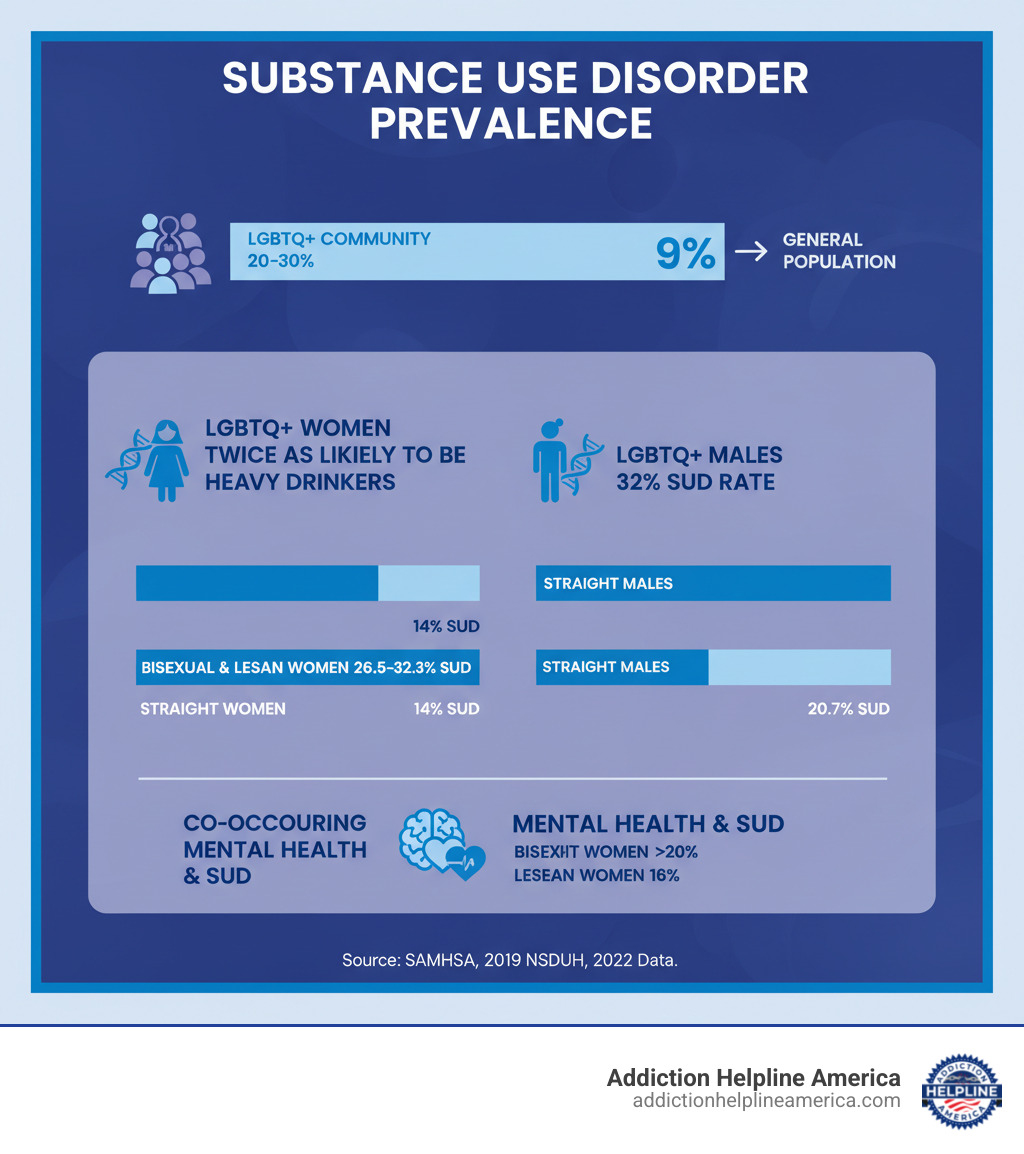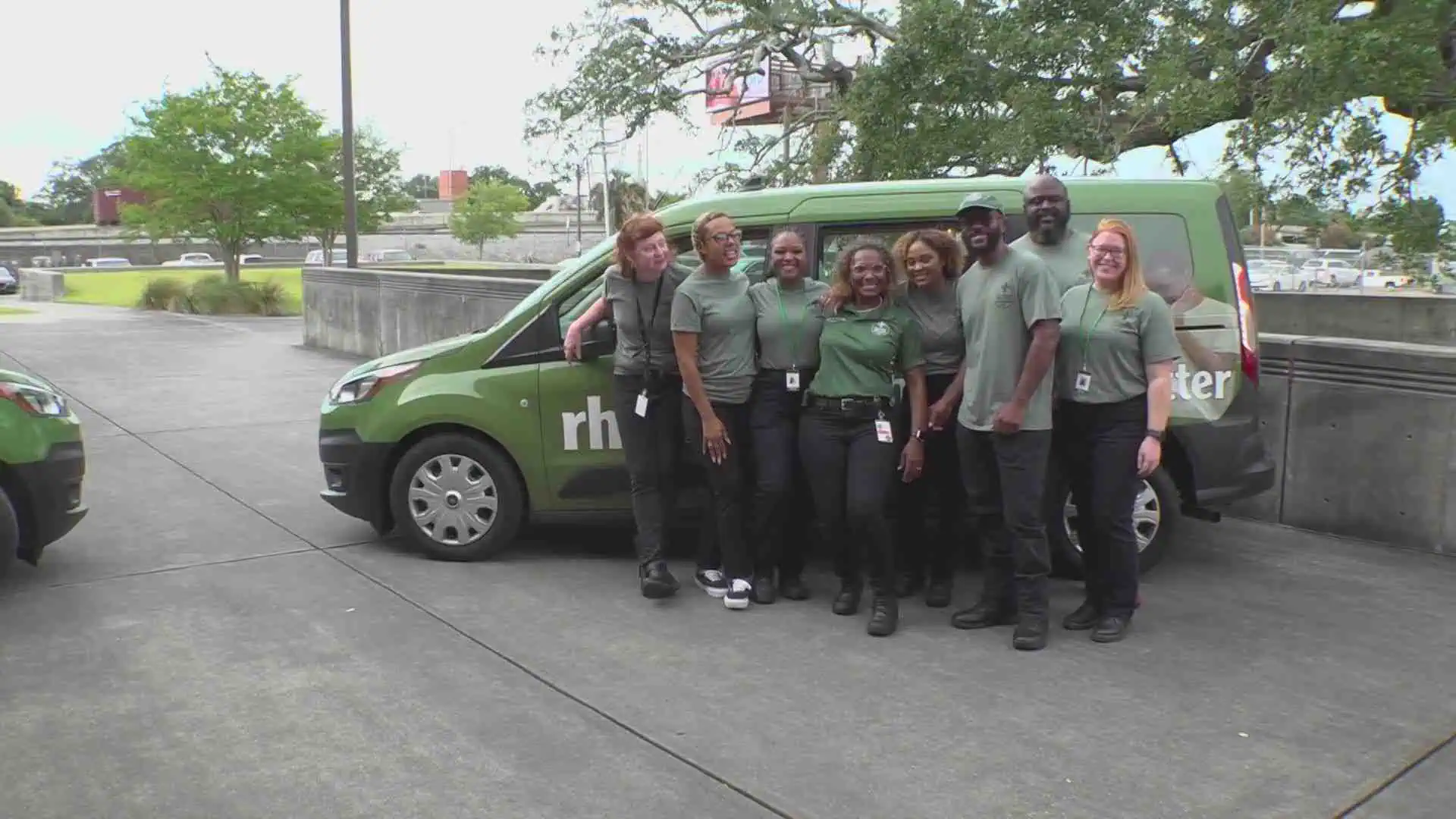
Why LGBTQ+ Individuals Need Specialized Support for Alcohol Recovery
LGBTQ alcohol rehab programs provide affirming addiction treatment designed to address the unique challenges faced by lesbian, gay, bisexual, transgender, and queer individuals. These programs offer safe, non-judgmental environments with culturally competent staff, integrated treatment for co-occurring mental health disorders, and evidence-based therapies. They also provide crucial peer support and family therapy that includes chosen family.
The need is clear. Research from SAMHSA shows that 20-30% of LGBTQ+ individuals struggle with substance use disorders, compared to just 9% of the general population. The 2019 National Survey on Drug Use and Health found that adults identifying as lesbian, gay, or bisexual were more than twice as likely as heterosexual adults to have used an illicit drug in the past year. For LGBTQ+ women, the disparity is even greater, as they are twice as likely to be classified as heavy drinkers.
These high rates are often a result of minority stress—the chronic pressure of navigating a society where discrimination, stigma, and rejection are daily realities. These experiences can lead to co-occurring mental health challenges, fueling substance use as a coping mechanism. Specialized LGBTQ+ alcohol rehab programs address these specific needs, significantly improving recovery outcomes.
At Addiction Helpline America, we connect LGBTQ+ individuals with affirming treatment centers where you’ll be welcomed, understood, and supported on your path to lasting recovery.
Basic LGBTQ alcohol rehab glossary:
Understanding the Link: Why LGBTQ+ Individuals Face Higher Addiction Risks
The disproportionately high rates of addiction in the LGBTQ+ community are not a sign of weakness but a direct result of societal pressures and discrimination. This phenomenon, known as “minority stress,” creates a heavy burden that can lead to substance use as a coping mechanism.
Stigma and Discrimination
For many LGBTQ+ individuals, daily life involves navigating judgment, prejudice, and the threat of harm. This constant stress, which includes everything from workplace bias to social rejection in family or friends, peer victimization and isolation, is exhausting and wears people down, making substance use seem like a viable escape.
Family Rejection
For too many, coming out leads to devastating family rejection. A 2009 study found that LGBTQ+ young adults who experienced strong family rejection were 8 times more likely to have attempted suicide, 6 times more likely to report severe depression, and 3 times more likely to use illegal drugs. The pain of this rejection often fuels substance use as a way to numb the emotional wounds.
Trauma and Hate Crimes
Violence and the threat of it are a harsh reality. With one in five LGBTQ+ individuals experiencing a hate crime in the past year, the resulting trauma, anxiety, and PTSD significantly increase the risk of turning to substances for relief.
Co-occurring Mental Health Disorders
Discrimination and trauma take a toll on mental health. LGBTQ+ individuals experience higher risk for mental distress and depression, and many turn to alcohol to self-medicate. An estimated 1.9 million lesbian, gay, or bisexual Americans experience co-occurring substance abuse and mental health disorders, yet a staggering 86.8% don’t receive the necessary treatment.
Bar-Centric Social Culture
Historically, bars were one of the few safe social spaces for the LGBTQ+ community. While more inclusive spaces now exist, this legacy has created a bar-centric culture that can make sobriety feel isolating and challenging for those in recovery.
The Numbers Behind the Need
Statistics highlight the urgent need for specialized care. About 32% of LGBTQ+ males had a substance use disorder in 2022, compared to 20.7% of straight males. For women, 26.5–32.3% of lesbian and bisexual women were diagnosed with SUD, versus 14% of straight women. These numbers represent people who deserve compassionate, informed care. For more information, explore LGBTQ+ Addiction Treatment.
At Addiction Helpline America, we connect you with treatment programs where your identity is respected and understood as an essential part of your healing journey.
What Makes an LGBTQ Alcohol Rehab Program Effective? 5 Key Components
Not all rehab programs are created equal. An effective LGBTQ alcohol rehab program is intentionally designed to honor, support, and address the specific experiences of the community, going far beyond simply accepting LGBTQ+ clients.
When treatment acknowledges the unique challenges you’ve faced—from discrimination to family rejection—the results improve dramatically. You’re more likely to complete treatment and build a foundation for lasting recovery.
Research supports that addiction treatment programs that address common sensitivities to the LGBTQ+ community, such as homophobia, family problems, and social isolation, are especially effective. This isn’t about special treatment; it’s about appropriate, evidence-based care that acknowledges your whole story.
In an affirming space, you can focus all your energy on healing, surrounded by staff and peers who understand your journey. So what makes an LGBTQ alcohol rehab program truly effective? Here are the five essential components to look for:
1. Integrated Dual Diagnosis in an LGBTQ Alcohol Rehab
For many LGBTQ+ individuals, alcohol use is deeply intertwined with mental health challenges. The weight of discrimination, trauma, and rejection often leads to co-occurring conditions like depression, anxiety, and PTSD. Substance use frequently begins as a way to self-medicate these painful feelings.
Statistics confirm this link. Sexual minorities with substance use disorder are more likely to have a co-occurring psychiatric disorder than their heterosexual counterparts. Treating the addiction without addressing the underlying mental health issues is like bailing water from a boat with a hole in it—the effort is futile.
An effective LGBTQ alcohol rehab program provides integrated dual diagnosis treatment. This means your mental health and substance use disorders are addressed simultaneously by the same clinical team. Your therapist understands how your anxiety triggers cravings, and your addiction counselor recognizes how depression impacts your recovery. This comprehensive approach also addresses related health concerns, such as the increased risk for STIs and HIV.
By healing your mind and your relationship with substances together, you build a foundation for real, lasting recovery. If you need immediate mental health support, learn more about More info about Crisis Stabilization Units.
2. A Safe, Affirming, and Culturally Competent Environment
Recovery is vulnerable work that requires a space where you can be your authentic self without fear of judgment. A genuinely safe, affirming, and culturally competent environment is therefore an essential component of any effective LGBTQ alcohol rehab program.
This environment is built on several key pillars:
-
Culturally Competent Staff: The team is not just tolerant but actively welcoming and trained in LGBTQ+ specific issues. They understand concepts like minority stress, use your preferred name and pronouns, and create a non-judgmental atmosphere.
-
Inclusive Policies and Design: The facility has a universal admissions policy that explicitly welcomes all LGBTQ+ individuals. This is supported by inclusive details like gender-neutral restrooms and housing options that respect your identity.
-
Relevant Programming: Treatment integrates discussions on identity, healthy relationships, and coping with discrimination. These topics are woven into therapy, not treated as a separate module.
Unfortunately, a lack of healthcare providers’ awareness and training creates barriers in many traditional settings. An affirming program closes this gap, ensuring every team member understands the unique stressors you face. When you feel seen and respected, you can stop defending yourself and start healing. For more on how targeted care makes a difference, see our guide on More info about Mens Rehab Centers.
3. Evidence-Based Therapies for LGBTQ Alcohol Rehab
An effective LGBTQ alcohol rehab program uses therapies that are proven to work, delivered by clinicians who know how to apply them to the unique experiences of the LGBTQ+ community. Research shows that approaches like empowerment, social support, motivational interviewing, and cognitive-behavioral therapy lead to positive recovery outcomes in the LGBTQ+ population.
Key therapeutic approaches include:
| Therapy Type | Description |
|---|---|
| Cognitive Behavioral Therapy (CBT) | Helps identify and change thought patterns and behaviors tied to alcohol use, such as those stemming from internalized shame or minority stress. |
| Dialectical Behavior Therapy (DBT) | Teaches skills for mindfulness, distress tolerance, and emotion regulation, which are vital for managing difficult emotions without substances. |
| Motivational Interviewing | A collaborative approach that helps you explore and strengthen your own motivation for change, respecting your autonomy. |
Beyond these, a quality program integrates other crucial elements:
- Trauma-Informed Care: Recognizes that many in the community have experienced trauma and creates a safe environment for healing.
- Family Therapy: Includes biological and chosen family to heal relationships, educate loved ones, and build a strong support network.
- Group Therapy: Provides a powerful sense of community and validation by connecting you with peers who share similar life experiences.
These therapies, when delivered in a culturally competent setting, provide the tools for lasting change. For some, recovery is also supported by medication. You can learn more about the role of medication in recovery and how it can be integrated into a treatment plan.
Understanding the Link: Why LGBTQ+ Individuals Face Higher Addiction Risks
The LGBTQ+ community faces a significantly higher risk of developing substance use disorders (SUDs), including alcohol addiction. This is not due to any inherent weakness but is a direct consequence of societal pressures known as “minority stress.”
Stigma, Discrimination, and Trauma
Living with the daily reality of stigma, discrimination, and the threat of violence creates chronic stress. This includes everything from exclusionary policies and social rejection in family or friends, peer victimization and isolation to harassment and hate crimes. This constant pressure takes a toll, leading many to use substances to numb the pain and trauma.
Family Rejection
When coming out is met with rejection, the impact is devastating. A 2009 study showed that LGBTQ+ young adults who faced strong family rejection were 8 times more likely to attempt suicide, 6 times more likely to report severe depression, and 3 times more likely to use illegal drugs.
Co-occurring Mental Health Disorders
The stress of discrimination leads to higher rates of mental health issues. Gay, lesbian, and bisexual individuals are at a higher risk for mental distress and depression. An alarming 86.8% of the 1.9 million lesbian, gay, and bisexual Americans with co-occurring disorders do not receive the substance abuse treatment they need.
Bar-Centric Social Culture
Historically, bars were among the only safe spaces for the LGBTQ+ community. This has left a legacy where social life can revolve around alcohol, making it difficult for those in recovery to find sober social networks.
Statistics on Prevalence
The numbers underscore the need for specialized LGBTQ alcohol rehab:
- The SUD rate in the LGBTQ+ community is 20-30%, compared to 9% in the general population.
- LGBTQ+ women are twice as likely to be classified as heavy drinkers.
- In 2022, 32% of LGBTQ+ males had an SUD, versus 20.7% of straight males.
- In the same year, 26.5–32.3% of lesbian and bisexual females had an SUD, compared to 14% of straight females.
These statistics represent people who need and deserve specialized care. To learn more, visit More info about LGBTQ+ Addiction Treatment.
What Makes an LGBTQ Alcohol Rehab Program Effective? 5 Key Components
An effective LGBTQ alcohol rehab program is more than just a standard facility that welcomes LGBTQ+ clients; it is a program intentionally designed to address the community’s unique challenges, traumas, and strengths.
This affirming approach creates a safe environment where individuals can be authentic, leading to better outcomes and reduced relapse rates. By addressing the root causes of substance use, such as the trauma of discrimination, healing becomes more profound and sustainable.
Research supports that addiction treatment programs that address common sensitivities to the LGBTQ+ community—like homophobia, family issues, and social isolation—are particularly effective. This evidence-based model focuses on person-centered, culturally competent care that honors each person’s journey.
So, what sets an exceptional LGBTQ alcohol rehab program apart? Here are the five key components that define truly transformative care:
1. Integrated Dual Diagnosis in an LGBTQ Alcohol Rehab
For many in the LGBTQ+ community, substance use is a way to self-medicate the pain of untreated mental health conditions like depression, anxiety, and PTSD. These issues often stem from the trauma of discrimination, rejection, and internalized shame.
The connection is undeniable. Sexual minorities with substance use disorder are more likely to have a co-occurring psychiatric disorder. Simply treating the addiction without addressing the underlying mental health struggle is rarely successful in the long term.
This is why an effective LGBTQ alcohol rehab program must offer integrated dual diagnosis treatment. This approach treats both conditions at the same time, with the same clinical team. It’s a comprehensive strategy that gets to the root of the problem, rather than just managing symptoms. This whole-person approach also includes addressing related physical health concerns, such as HIV or STIs.
When both conditions receive coordinated care, recovery becomes sustainable. For those in crisis, More info about Crisis Stabilization Units can provide immediate, life-saving support.
2. A Safe, Affirming, and Culturally Competent Environment
Imagine walking into a treatment center and immediately feeling safe. The intake form asks for your pronouns, the staff uses them correctly, and you see visible signs of support. This is what a truly affirming LGBTQ alcohol rehab environment feels like—not just tolerant, but genuinely welcoming.
Creating this safety requires several key elements:
-
Culturally Competent Staff: Professionals must be compassionate, non-judgmental, and trained in LGBTQ+ issues. They understand minority stress and can talk openly about identity without making clients feel like they have to educate them.
-
Inclusive Policies and Space: A clear, universal admissions policy should explicitly welcome all LGBTQ+ individuals. The physical space should support this with features like gender-neutral restrooms and housing options that respect identity.
-
Relevant Programming: Therapy must integrate discussions on identity development, navigating discrimination, and building healthy queer relationships. This stands in stark contrast to the lack of healthcare providers’ awareness and training that creates barriers elsewhere.
When you feel seen, heard, and respected, the walls come down and healing can begin. For more on how specialized environments make a difference, our guide on More info about Mens Rehab Centers offers additional context.
3. Evidence-Based Therapies for LGBTQ Alcohol Rehab
Effective LGBTQ alcohol rehab programs use evidence-based therapies delivered by clinicians who understand the community’s unique experiences. Research shows that empowerment, social support, motivational interviewing, and cognitive-behavioral therapy… found to be effective in achieving positive outcomes for LGBTQ+ individuals.
Core therapeutic approaches include:
- Cognitive Behavioral Therapy (CBT): Helps change negative thought patterns and behaviors related to substance use, particularly those stemming from internalized homophobia or discrimination.
- Dialectical Behavior Therapy (DBT): Teaches crucial skills for emotional regulation and distress tolerance, helping individuals manage painful feelings without turning to alcohol.
- Motivational Interviewing: A non-judgmental, collaborative style that helps people find their own internal motivation for recovery.
In addition, quality programs must integrate:
- Trauma-Informed Care: This is essential, given the high rates of trauma from rejection and hate crimes. It creates a safe space for healing without re-traumatization.
- Family and Group Therapy: Family therapy should include chosen family to repair relationships and build support. Group therapy with other LGBTQ+ peers reduces isolation and shame, fostering a powerful sense of community.
These therapies provide the tools for lasting sobriety. To learn how medication can complement these approaches, read our guide on the Role of Medication in recovery.
Our helpline is 100%
free & confidential
If you or someone you care about is struggling with drug or alcohol addiction, we can help you explore your recovery options. Don’t face this challenge alone—seek support from us.
Programs
Resources
Will my insurance
cover addiction
treatment?
We're ready to help
Find the best
drug or alcohol treatment
center
Are you or a loved one struggling with addiction? Call today to speak to a treatment expert.






